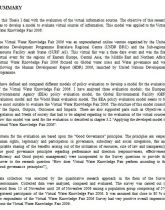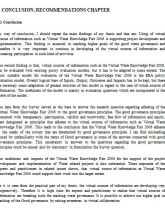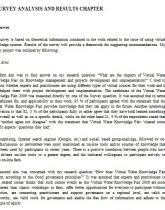Skriptá: Evaluating virtual information sources: the case of the Virtual Water Knowledge Fair
Skryť detaily | Obľúbený- Kvalita:76,9 %
- Typ:Skriptá
- Kategória:Technika
- Podkategória:Informatika
- Dokumentácia:Stiahni
- Rozsah A4:69 strán
- Zobrazené:1 078 x
- Stiahnuté:1 x
- Veľkosť:2,6 MB
- Formát a prípona:MS Office Word (.doc)
- Jazyk:anglický
- ID projektu:11077
- Posledna úprava:29.10.2018
In this Thesis I deal with the evaluation of the virtual information sources. The objective of this research was to develop a model to evaluate virtual sources of information. This model was applied to the Virtual Water Knowledge Fair 2006.
The Virtual Water Knowledge Fair 2006 was an unprecedented online venture organized by the United Nations Development Programme Bratislava Regional Centre (UNDP BRC) and the Sub-regional Resource Facility Arab States (SURF AS). This virtual fair was a three days event and was the first virtual event for the regions of Eastern Europe, Central Asia, the Middle East and Northern Africa. Virtual Water Knowledge Fair 2006 focused on Global water crisis and Water governance and was following the Human Development Report (HDR) 2006, launched by United Nations Development Programme.
I have defined and compared different models of policy evaluation to develop a model for the evaluation of the Virtual Water Knowledge Fair 2006. I have analyzed three evaluation models: the European Environmental Agency (EEA) policy evaluation model, the Global Environmental Facility (GEF) evaluation model and the World Bank evaluation model. The EEA policy evaluation model seems to be the most suitable to evaluate the Virtual Water Knowledge Fair 2006. The structure of this model consists of the Inputs, Outputs, Outcomes and Impacts. There are also supported parts such as Objectives of legislation and Needs of society that had to be adapted regarding to the evaluation of the virtual sources. How this model was used for the evaluation is described in chapter 3.2 “Applying the developed model to Virtual Water Knowledge Fair 2006”.
Criteria for the evaluation are based upon the “Good Governance” principles. The principles are: respect human rights, legitimacy and participation in governance, subsidiary and social integration, fair and equitable sharing of the benefits arising out of the utilization of resources, rule of law and transparency. The good governance principles regarding performance and direction (responsiveness, effectiveness, efficiency and Good project management) were incorporated to the Survey questions to provide the answer to the research question “How does Virtual Water Knowledge Fair perform according to the Good governance principles?”.
Data collection was executed by the quantitative research approach in the form of the Survey questionnaire. Collected data were analyzed, compared and evaluated. The survey was carried out in period from 15 of November until 26 of November 2006 among a population group comprising of 576 registered participants of the Virtual Water Knowledge Fair 2006. It was assumed that close to 80 % of the respondents of the Virtual Water Knowledge Fair 2006 Survey had very positive overall impression about the Virtual Water Knowledge Fair 2006.
The Virtual Water Knowledge Fair 2006 enabled long-term collaboration of water professionals around the world, the exchange of good practices and the establishment of new partnerships. The results of the evaluation of the Virtual Water Knowledge Fair 2006 are showing that this virtual event is leading to the broadening of the horizons, enabling the exchange of experiences and ideas, showcasing some of the innovative approaches to water governance and finally to the reaching of the good water governance.
The Virtual Water Knowledge Fair 2006 was an unprecedented online venture organized by the United Nations Development Programme Bratislava Regional Centre (UNDP BRC) and the Sub-regional Resource Facility Arab States (SURF AS). This virtual fair was a three days event and was the first virtual event for the regions of Eastern Europe, Central Asia, the Middle East and Northern Africa. Virtual Water Knowledge Fair 2006 focused on Global water crisis and Water governance and was following the Human Development Report (HDR) 2006, launched by United Nations Development Programme.
I have defined and compared different models of policy evaluation to develop a model for the evaluation of the Virtual Water Knowledge Fair 2006. I have analyzed three evaluation models: the European Environmental Agency (EEA) policy evaluation model, the Global Environmental Facility (GEF) evaluation model and the World Bank evaluation model. The EEA policy evaluation model seems to be the most suitable to evaluate the Virtual Water Knowledge Fair 2006. The structure of this model consists of the Inputs, Outputs, Outcomes and Impacts. There are also supported parts such as Objectives of legislation and Needs of society that had to be adapted regarding to the evaluation of the virtual sources. How this model was used for the evaluation is described in chapter 3.2 “Applying the developed model to Virtual Water Knowledge Fair 2006”.
Criteria for the evaluation are based upon the “Good Governance” principles. The principles are: respect human rights, legitimacy and participation in governance, subsidiary and social integration, fair and equitable sharing of the benefits arising out of the utilization of resources, rule of law and transparency. The good governance principles regarding performance and direction (responsiveness, effectiveness, efficiency and Good project management) were incorporated to the Survey questions to provide the answer to the research question “How does Virtual Water Knowledge Fair perform according to the Good governance principles?”.
Data collection was executed by the quantitative research approach in the form of the Survey questionnaire. Collected data were analyzed, compared and evaluated. The survey was carried out in period from 15 of November until 26 of November 2006 among a population group comprising of 576 registered participants of the Virtual Water Knowledge Fair 2006. It was assumed that close to 80 % of the respondents of the Virtual Water Knowledge Fair 2006 Survey had very positive overall impression about the Virtual Water Knowledge Fair 2006.
The Virtual Water Knowledge Fair 2006 enabled long-term collaboration of water professionals around the world, the exchange of good practices and the establishment of new partnerships. The results of the evaluation of the Virtual Water Knowledge Fair 2006 are showing that this virtual event is leading to the broadening of the horizons, enabling the exchange of experiences and ideas, showcasing some of the innovative approaches to water governance and finally to the reaching of the good water governance.



